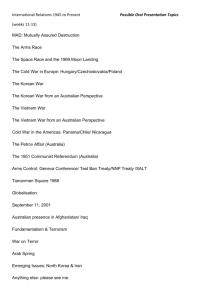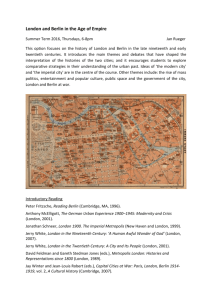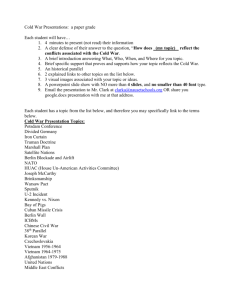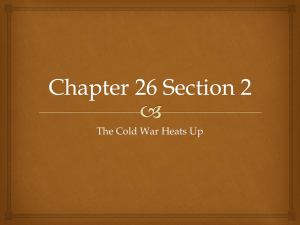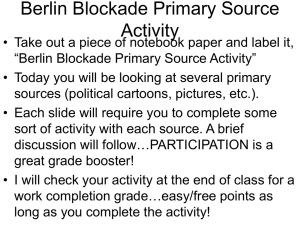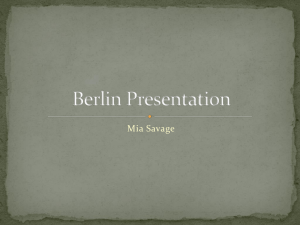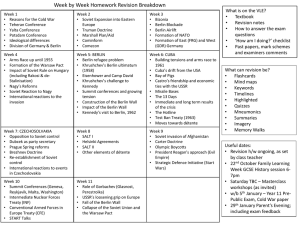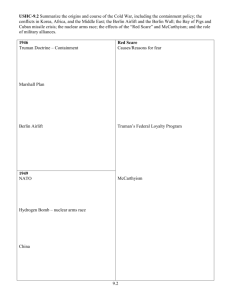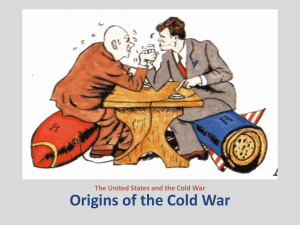Copy of packet
advertisement
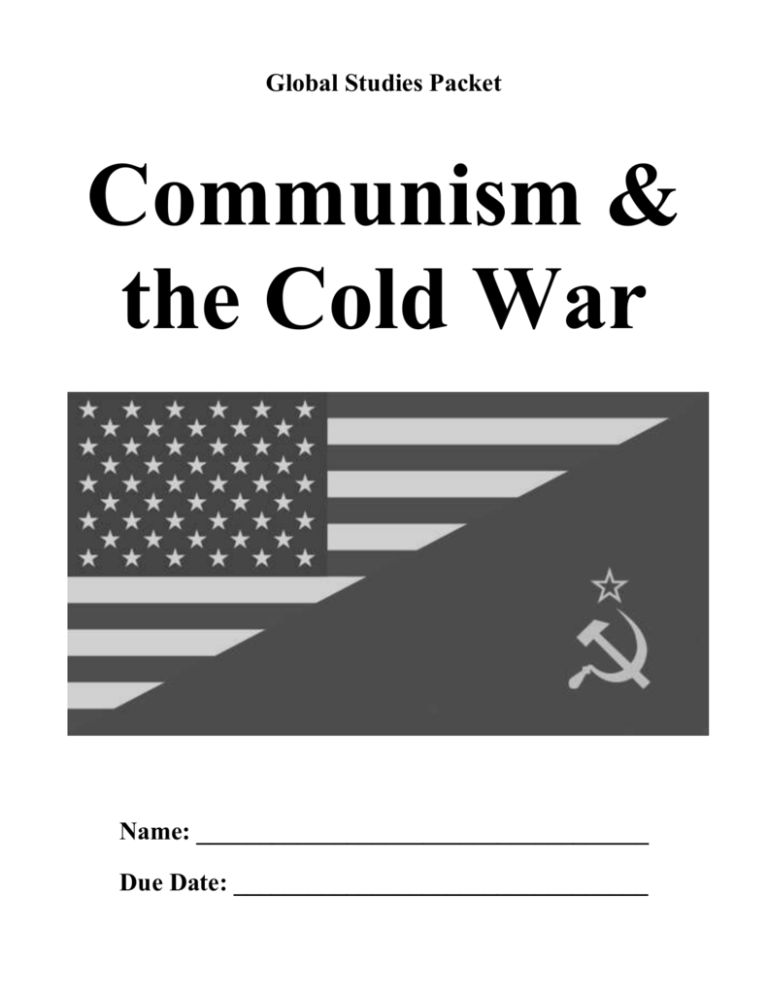
Global Studies Packet Communism & the Cold War Name: ____________________________________ Due Date: _________________________________ Communism Notes 1. Communism is also known as: ________________________or _______________________. 2. The founding fathers of Communism were _______________________________ and _____________________________, who were ______________________________________. 3. The basic ideas of Communism: • Individual _______________________ of property ends. • All property is owned _______________________ by all of the _______________________. •____________________________ controls the whole economy. • Economic decisions are made to benefit the __________________ as a whole. • Everyone is expected to __________________ to the economy based upon his ____________ and to ___________________ goods and services based upon his ____________________. • A _________________ society in which everyone is ______________ is created. • _________________, “the opiate of the masses,” is ________________________. • Communism is _______________ around the world creating a __________________ society. 4. Communist terms: ______proletariat A. everyone is equal ______bourgeoisie B. working class ______means of production C. factories ______classless society D. strong communist government ______dictatorship of the masses E. merchant class 5. Using the terms: The ________________________ will rise up and seize the ___________________________ from the ____________________________ and then create a __________________________ to help build a new ___________________________. CLASS WORK PAGE 1 Timeline of the Cold War Use the timeline on Mr. Nolen’s website to answer the following questions. 1. When did the Cold War start? 2. What two wars are considered to be part of the Cold War? 3. Why did the Communists build the Berlin Wall? 4. What competition between the U.S. and Soviets started after Sputnik was launched? 5. Who did many of the Afghan mujahedeen later become? 6. What two policies did Soviet leader Mikhail Gorbachev introduce in the 1980s? 7. Which country backed North Korea? 8. When did the Cold War end? CLASSWORK PAGE 2 The Cold War Notes I. Definition: __________________________________________________________________ _____________________________________________________________________________ II. Types of Competition A. Economic: ___________________________________________________________ B. Political: ____________________________________________________________ 1. U.S. supported by _______________________________ 2. U.S.S.R. supported by _______________________________ C. Wars: ___________________ and ______________________ D. Space Race: U.S.S.R first ___________________ (______________). U.S. first _______________ (______________) E. Nuclear Race: _______________________________ almost led to nuclear war F. Sports: _______________________ III. Important Soviet Leaders A. _____________________________ (1917-1924): __________ of Communist Russia B. _____________________________ (1924-1953): Brutal dictator who led Russia during ___________ C. _____________________________ (1953-1964): Colorful character who led Russia during _________________________________ D. _____________________________ (1985-1991): _____________ leader of Soviet Union who proposed “glastnost” (_________________) and “perestroika” (_________________) Joseph Stalin and Vladimir Lenin CLASS WORK PAGE 3 The Berlin Blockade Use the reading on Mr. Nolen’s website to answer the following questions in complete sentences. 1. Why was the Berlin Blockade significant? 2. Name and describe the leader of the Soviet Union during the Berlin Blockade. 3. Why did the Soviets blockade Berlin? 4. How did the United States respond to the blockade? 5. What might have happened if the Berlin Airlift had failed? CLASS WORK PAGE 4 The Cuban Missile Crisis Use the reading on Mr. Nolen’s website to answer the following questions. 1. Why was the Cuban Missile Crisis significant? 2. Who were the leaders of the nations during the Cuban Missile Crisis? A. USSRB. CubaC. US3. What event marked the start of the Cuban Missile Crisis? 4. How long did the crisis last? 5. How did Kennedy choose to respond to the threat of Soviet missiles in Cuba during the first period of the crisis? 6. What did people fear would happen during the second phase of the crisis? 7. What did each side agree to do as part of the settlement? A. The USSR promised to: B. The US promised to: 8. What were the effects of the Cuban Missile Crisis? CLASS WORK PAGE 5 Sputnik Questions Use the reading on Mr. Nolen’s website to answer the following questions. 1. Describe Sputnik in complete sentences. (What is it? When was it launched? Who launched it? Why is it important?) 2. Why did Sputnik cause the United States to fear the Soviet Union? 3. In what two other ways did the Soviet Union beat the United States in the space race? • • 4. How did the United States win the space race? 5. Describe the following individuals: a. Laika: b. Yuri Gagarin c. Alan Shepard: 6. Do you think the United States will be in a Sputnik-like race with another country in the future? Why or why not? Answer in complete sentences. CLASS WORK PAGE 6 The Berlin Wall We will complete the following as a class. 1. The Berlin Wall was built by the __________________________ to separate _________ and _________ Berlin. 2. East Berlin was __________________________ and West Berlin was ____________. 3. The wall included the famous ________________________________ Gate and the crossing was known as _________________________________________. We will answer the following questions based upon the video 20th Anniversary of the Fall of the Berlin Wall (http://www.youtube.com/watch?v=6bw5pFiTeb0) 4. When was the Berlin Wall built? 5. Which US president first gave a speech at the Berlin Wall? 6. Why was the Berlin Wall built? 7. How many people escaped across the Berlin Wall? 8. How did people escape across the Berlin Wall? 9. How many people were killed trying to escape across the wall? 10. Which US president gave a famous speech saying, “Tear down this wall”? 11. When was the wall opened? CLASS WORK PAGE 7 The Cold War Questions Use the reading on Mr. Nolen’s website to answer the following questions. 1. What was the Cold War? 2. Describe the two sides during the Cold War. 3. Why is called the “cold” war? 4. Who was the leader of the Soviet Union at the start of the Cold War? 5. What two events of 1949 intensified the Cold War? 6. How did the Cold War turn hot in 1950? 7. During what event did the Cold War reach the brink of nuclear war? 8. What war did the US fight in the late 60s and early 70s? 9. What was the most dramatic event of 1989? 10. What US president declared that the Cold War was over in 1990? HOMEWORK PAGE 8 My Bomb Shelter Use the reading from Mr. Nolen’s website to design your own bomb shelter. Create a diagram using 10 details from the reading and include labels. Good luck surviving World War III! HOMEWORK PAGE 9 Timeline of the Cold War 1. Use the reading on Mr. Nolen’s website to fill in the dates below. 2. Search the web for picture for each of the events. Save them on your iPad. 3. Use the RWT Timeline app to create a timeline of these events. Include pictures. ___________- Cold War begins ___________ to ___________- Berlin Airlift ___________ to ___________- Korean War ___________- USSR launches Sputnik ___________- Berlin Wall constructed ___________- US increases involvement in Vietnam ___________- Cuban Missile Crisis ___________- Apollo 11 land on the moon ___________- North Vietnam defeats South Vietnam ___________- Berlin Wall falls ___________-:End of USSR & Cold War HOMEWORK PAGE 10 Cold War Study Guide Each Friday, we will have a quiz on the week’s packet. The most important things to know are on this study guide. 1. Communism Notes a. give two other names for communism b. identify who owns businesses and farms in communist countries c. define classless society 2. The Cold War Notes a. define the Cold War b. identify the economic systems of the U.S. and the U.S.S.R. c. identify two wars that were part of the Cold War d. list four ways the U.S. and U.S.S.R. competed against each other 3. The Berlin Blockade a. identify which German city was a Cold War hotspot b. describe how the U.S. overcame the Berlin Blockade 4. The Cuban Missile Crisis a. identify the most dangerous episode of the Cold War b. recall the leaders of the U.S. and the U.S.S.R. c. explain how the conflict started and how it ended 5. The Berlin Wall a. describe why the Communists built the Berlin Wall 7. Timeline of the Cold War a. put major events of the Cold War in the order they occurred STUDY GUIDE PAGE 11
